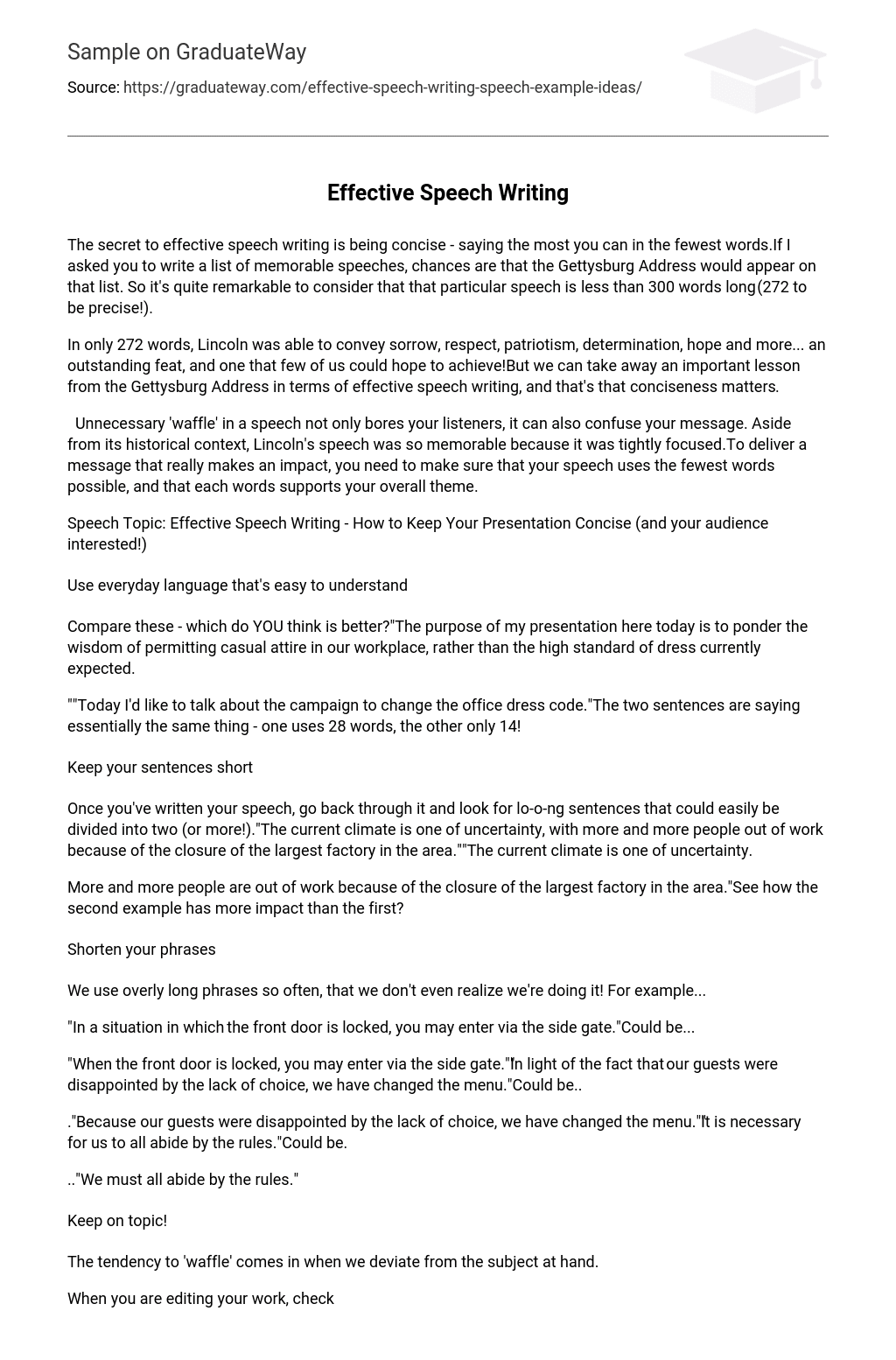The secret to effective speech writing is being concise – saying the most you can in the fewest words.If I asked you to write a list of memorable speeches, chances are that the Gettysburg Address would appear on that list. So it’s quite remarkable to consider that that particular speech is less than 300 words long (272 to be precise!).
In only 272 words, Lincoln was able to convey sorrow, respect, patriotism, determination, hope and more… an outstanding feat, and one that few of us could hope to achieve!But we can take away an important lesson from the Gettysburg Address in terms of effective speech writing, and that’s that conciseness matters.
Unnecessary ‘waffle’ in a speech not only bores your listeners, it can also confuse your message. Aside from its historical context, Lincoln’s speech was so memorable because it was tightly focused.To deliver a message that really makes an impact, you need to make sure that your speech uses the fewest words possible, and that each words supports your overall theme.
Speech Topic: Effective Speech Writing – How to Keep Your Presentation Concise (and your audience interested!)
Use everyday language that’s easy to understand
Compare these – which do YOU think is better?”The purpose of my presentation here today is to ponder the wisdom of permitting casual attire in our workplace, rather than the high standard of dress currently expected.
“”Today I’d like to talk about the campaign to change the office dress code.”The two sentences are saying essentially the same thing – one uses 28 words, the other only 14!
Keep your sentences short
Once you’ve written your speech, go back through it and look for lo-o-ng sentences that could easily be divided into two (or more!).”The current climate is one of uncertainty, with more and more people out of work because of the closure of the largest factory in the area.””The current climate is one of uncertainty.
More and more people are out of work because of the closure of the largest factory in the area.”See how the second example has more impact than the first?
Shorten your phrases
We use overly long phrases so often, that we don’t even realize we’re doing it! For example…
“In a situation in which the front door is locked, you may enter via the side gate.”Could be…
“When the front door is locked, you may enter via the side gate.””In light of the fact that our guests were disappointed by the lack of choice, we have changed the menu.”Could be..
.”Because our guests were disappointed by the lack of choice, we have changed the menu.””It is necessary for us to all abide by the rules.”Could be.
..”We must all abide by the rules.”
Keep on topic!
The tendency to ‘waffle’ comes in when we deviate from the subject at hand.
When you are editing your work, check that everything you have written relates in a clear way to the main message of your speech.
Avoid the passive voice
It tends to make sentences longer, more confusing, and greatly reduces their impact.Not sure what this means?With the passive voice, the subject of a sentence becomes the object (or is missing altogether).For example.
..The artist displayed his painting. (Active)The painting was displayed by the artist.
(Passive)The active sentence has 5 words – the passive has 7! And the overall message is simply clearer in the active voice.If you struggle to identify the passive voice in your work, then I highly recommend the Hemingway App (it’s free!). Hemingway was famed for his simple, unadorned use of words and the app will help you adopt this style in your own writing.
Use visual aids
There is much truth in the old idiom ‘a picture is worth a thousand words’.
Pie charts and diagrams can help you present a great deal of information – that would otherwise be boring! – in a very easy-to-understand way.
Avoid being TOO brief…
It’s very important that your speech includes all the key points. This is why I recommend that you DON’T worry about being concise in your initial draft – instead, write freely, then edit your words.That way, you will see that all the main points are there and you can focus on paring away the unnecessary words and details.And if there are no time constraints on the length of your speech, remember the wise words of the Academy award winning actor Sir John Mills –‘Be sincere, be brief, then be seated.’





